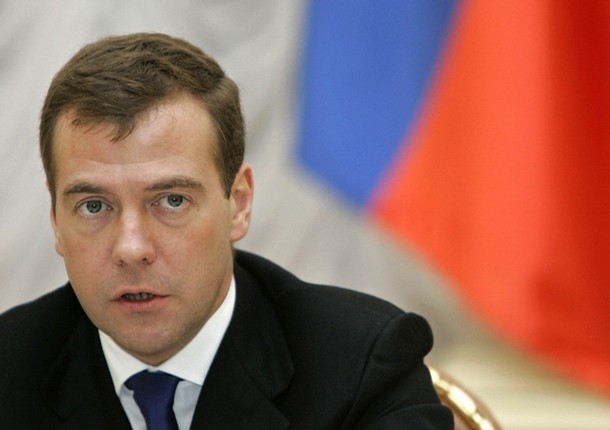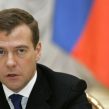
MEDVEDEV INTERVIEW CONTINUES TO MAKE WAVES
Publication: Eurasia Daily Monitor Volume: 2 Issue: 69
By:

The interview with Kremlin administration chief Dmitry Medvedev published in the magazine Ekspert on April 4 has drawn wide commentary from Russia’s media and political elite (see EDM, April 7). While the interview was wide-ranging and touched on a number of issues, Medvedev’s warning about what he believes will be the dire consequences of a failure to unite Russia’s elites has received most attention. “If we do not manage to consolidate the elites, Russia can disappear as a unified state,” he said. “Whole empires have been washed off the geographical map when their elites were deprived of a unifying idea and got into a deadly fight. The consolidation of the Russian elite is possible only on one platform — the preservation of effective statehood within the existing boundaries…Recent years were successful in strengthening the unity of the state, providing the stability needed for economic growth. But if [we] relax or give in to drift, the consequences will be monstrous. The break-up of the [Soviet] Union may seem like a morning performance in a kindergarten compared to a state collapse in contemporary Russia. And then it will be bad for everyone, including our near and distant neighbors.”
Like other observers, Boris Bishnevsky of Novaya gazeta said that the appearance of Medvedev’s interview was tied above all to the “2008 problem” — that is, the Kremlin’s concern with ensuring what some Russian observers like to call “the continuity of power” after President Vladimir Putin finishes his second and last constitutionally-mandated presidential term.
“And that is why it is necessary at all costs ‘to consolidate the elite’, otherwise the consequences will be ‘monstrous’,” Bishnevsky wrote, quoting from Medvedev’s interview. “To wit – ‘the destabilization of social life [as a result] of a large-scale fight among the elites’ that ‘will lead to a redistribution of property’… Is it possible to say any more clearly what is most frightening for the greedy group of the president’s inner circle, which is swiftly devouring all large pieces of property available in the country? ‘The vector will change’ – and then good-bye to everything amassed during the years of mature Putinism, during the period of ‘feeding’ on Gazprom or RAO UES [Unified Energy Systems], Rosneft, or Svyazinvest. New elites will come and take away everything without the slightest pity – [using] the methods perfected to brilliance precisely by those from whom it all will be taken away…In light of this clear prospect, the Putin clan has only one means of action: not to allow power to change hands. Not at any price and not under any circumstances.”
Bishnevsky noted that the Kremlin administration fulfilled a similar task both in 1996, when Boris Yeltsin was reelected, and in 1999, when Yeltsin resigned several months before the end of his final presidential term. “And in both cases, skillfully organized fear helped: in 1996, fear of a Communist return; in 1999, fear of new terrorist attacks. Most likely, neither of those ploys will work: it will be necessary to come up with something new.” The simplest variant, Bishnevsky wrote, would be to repeal the constitutional provision that limits presidents to two terms in office. Another possibility would be to create a “parliamentary republic” in which there is no presidential post or the presidency becomes simply “decorative” with Putin becoming head of the ruling United Russia party and thus prime minister. This would also require changing the constitution, but in Bishnevsky’s view, that is merely “a technical problem.” The third possibility is “a new ‘Operation Successor’,” Bishnevsky writes, referring to the Yeltsin inner circle’s search for a successor that ultimately put Vladimir Putin in the Kremlin. Such a search, however, is “fraught with a repeat of 2000: the successor can dump his benefactors and begin his own game.”
Whatever the case, Bishnevsky concludes that the only variant “that for sure is not being discussed by the Petersburg lawyers is honest…presidential elections with power being transferred to the winner. They will never take such a risk” (Novaya gazeta, April 7).
Some observers have speculated that Medvedev’s interview reflected Kremlin concern over the popular discontent across Russia sparked by the unpopular replacement of in-kind social benefits with cash payments, over growing unrest and anger at the powers-that-be in such regions as Bashkortostan and Ingushetia (see EDM, April 7), and over the developments in Georgia, Ukraine, and Kyrgyzstan, where popular movements removed entrenched corrupt and/or authoritarian administrations. The results of a recent poll, however, suggest that even if popular discontent in Russia increased to the point of threatening the Putin administration’s hold on power – something that is by no means inevitable or even likely – it would not necessarily benefit Western-style democrats.
The poll, conducted by the Public Opinion Foundation March 26-27 among 1,500 Russians in 100 cities and towns in 44 oblasts, krais, and republics, along with 600 Muscovites, found that 34% of Russians believe there is too little democracy in Russia today, 21% think there is too much, and 17% believe there is the right amount (28% said the questions was hard to answer). But when asked during which period they thought there had been the greatest democracy, 29% of those polled said it was under Putin, 14% said it was under Leonid Brezhnev, 11% said it was under Mikhail Gorbachev, 9% said it was under Boris Yeltsin, 5% said it was under Yuri Andropov, 2% said it was under Nikita Khrushchev, and 2% said it was under Josef Stalin (28% of those polled said the question was hard to answer) (fom.ru, March 31).




